Pulling Back The Curtain on Eggs – Are They Healthy or Not?
TABLE OF CONTENTS:
The truth about eggs is out there somewhere – but it so often seems to be shrouded in controversy and varying opinions.
- Are they good for you or detrimental to your health?
- How would you know?
- Are some eggs healthier than others?
What we do know is that eggs are an essential part of US food production. In fact, US table egg production totaled 92.6 billion in 2022. That said, misconceptions run wild about this amazing food, its health benefits, and how you can use this information to produce better, healthier eggs.
At the Mobile Chicken House, we’ve been raising chickens and building coops since we were kids. Today, we want to put our knowledge and experience to work and help answer some big questions about egg health.
Ready? Let’s get cracking!
Egg Myths
When it comes to egg nutrition, it can be hard to separate fact from fiction. One day, research would say eggs are unhealthy for you, and a little later, new research suggests the opposite.
There are some egg myths, however, that seem to stick around quite a bit.
Let’s address some of these myths and try to set the record straight!
Eggs are high in cholesterol
Let’s start with a disclaimer: we aren’t doctors and don’t want to try to play the role of a health professional. If you have any specific health issues that may be affected by consuming eggs, please consult your doctor!
That said, after years of being in the egg industry, we have learned a thing or two about them.
Eggs have amazing nutritional benefits, being an excellent source of proteins and vitamins. However, eggs have been blamed for increased cholesterol levels. Recent studies have indicated that it’s how eggs are consumed that might be to blame, as eggs tend to be consumed with other foods with high trans fats and saturated fats, such as bacon, or even how they’re cooked, such as in butter.
Other studies have shown that healthy people can eat up to seven eggs a week without increased heart risk, especially if they consume pasture-raised eggs.
So here’s the takeaway:
Moderation is the key to making eggs a healthy part of your diet!
Orange yolks are better for you
There are claims that orange yolks are healthier for you, but the truth is that egg yolk color is entirely affected by the feed they eat. Beta carotene, which is present in some foods that chickens eat such as alfalfa and pumpkin seeds, contribute to the darker yolk color.
Nutritionally, there is no significant difference in the yolks of different colored eggs. The yolk is a rich source of essential vitamins, proteins, and minerals, regardless of color!
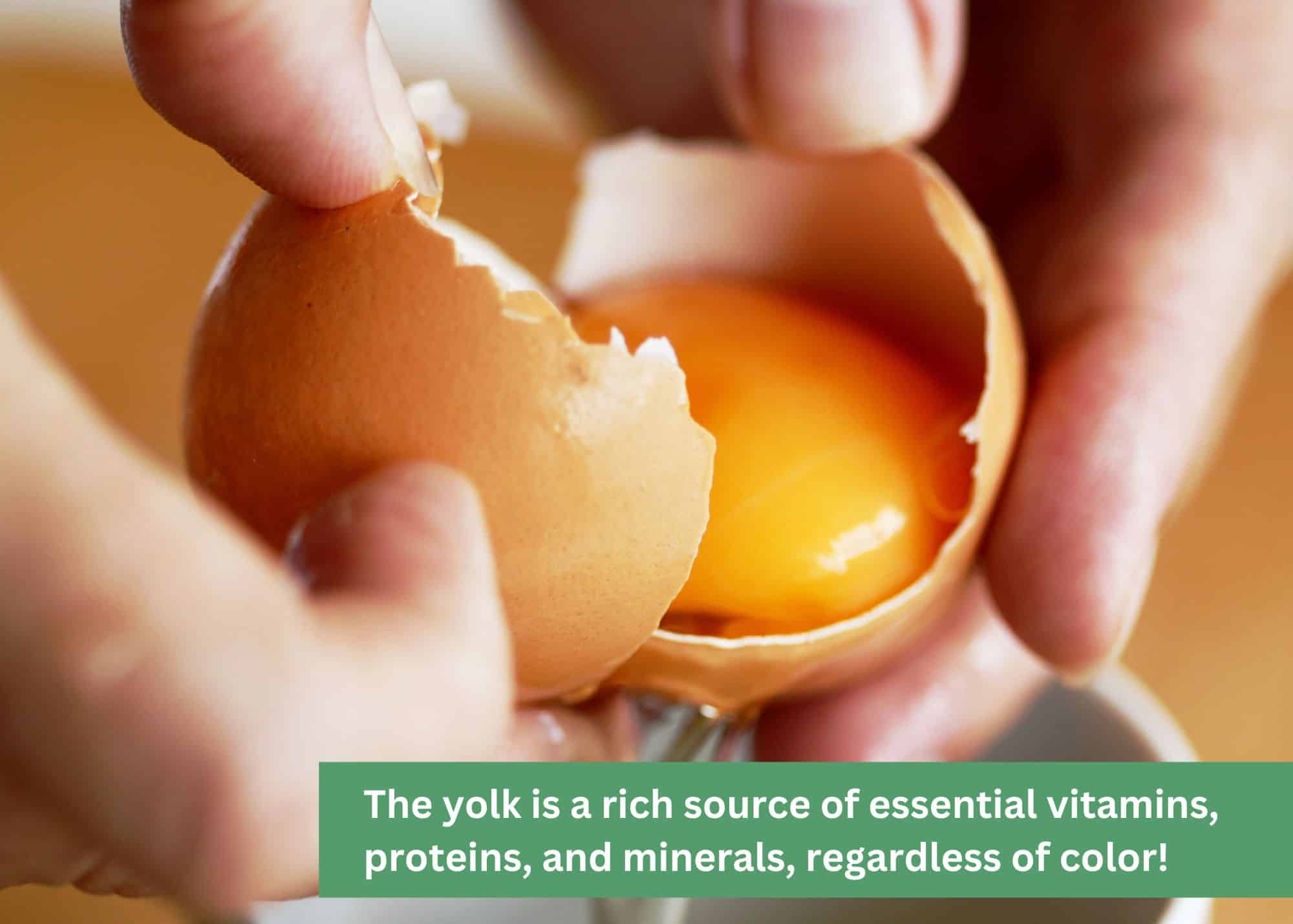
Eggs are not suitable for people with diabetes.
Eggs are a beneficial source of protein for people with diabetes. According to the American Diabetes Association (ADA), eggs are a good choice for people with diabetes because they are low in carbohydrates and high in protein, and have a low glycemic index score.
A hard-boiled egg is a handy high-protein snack, and the protein helps keep one full without affecting blood sugar. The protein not only slows digestion but also slows glucose absorption. So eggs make a great addition to the diet!
Egg Facts
Now that we’ve examined some egg myths, let’s explore some facts behind this delicious and versatile food:
It’s a popular protein source.
In the United States, eggs are meat's second most popular protein source. Their small size, portability, and nutritional value make eggs an excellent choice for eating on the go.
Hard boiled eggs are one of the easiest and healthiest ways to eat an egg.
Eggs are rich in Vitamin D.
Eggs are one of the few foods that naturally contain vitamin D, along with mushrooms, and certain fish. While it’s true that you also receive Vitamin D through sunlight, modern humans spend more time indoors than out, so sunlight alone is not quite adequate.
So while you’re typing away at the office, how about a healthy snack at your desk by snacking on an egg?
Better conditions lead to better eggs.
Studies have indicated that improving the hen’s housing conditions, including more space allocated per hen and allowing for more natural behaviors such as scratching and foraging, lead to less stressed chickens and consequently better eggs.
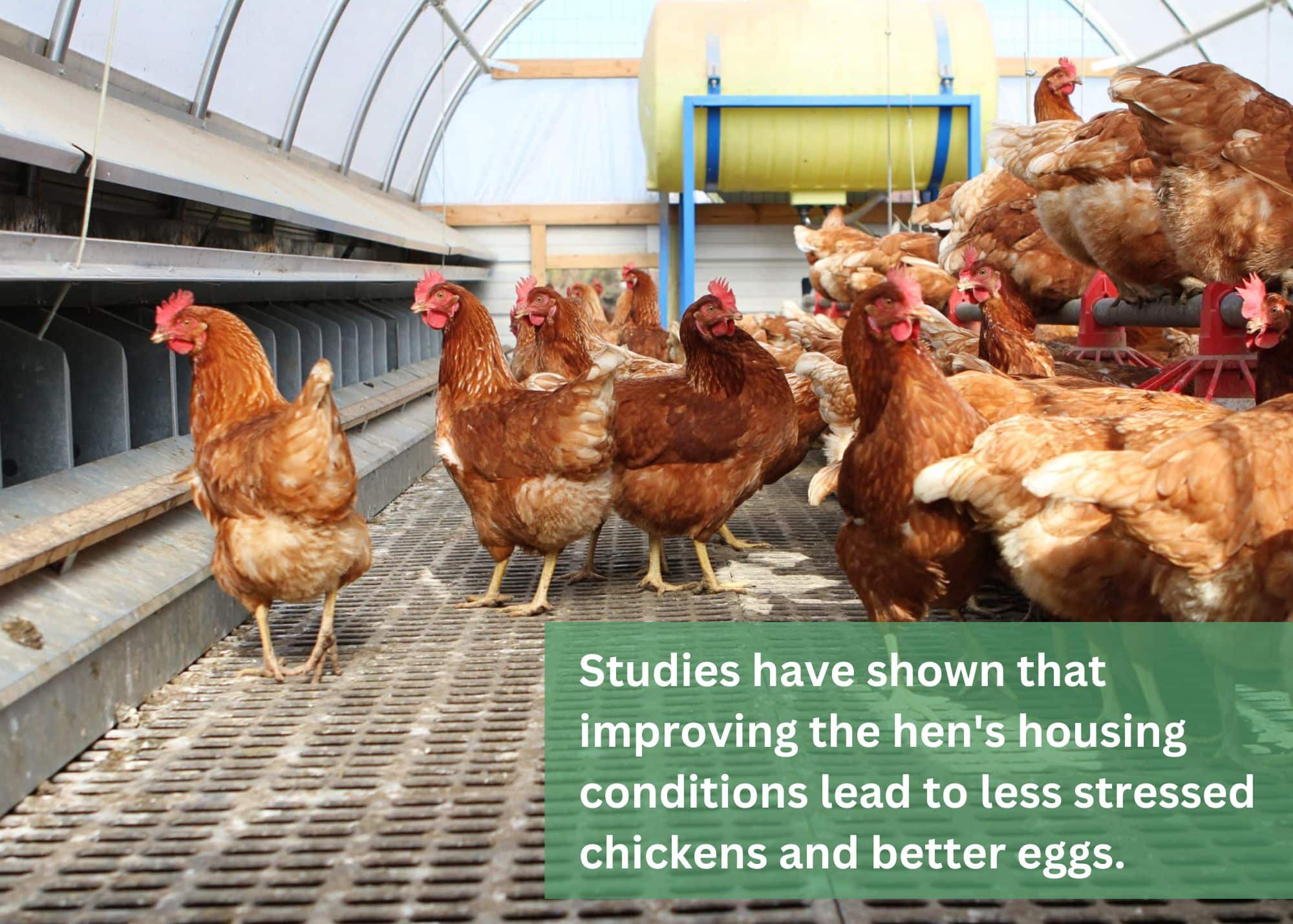
Egg producers have been moving away from caged hens, but not all cage-free eggs are the same.
Want in on the secret?
Let’s examine some differences and how you can produce the best eggs for your customers.
Raising Good Chickens for Good Eggs
Raising hens for eggs begins with housing your hens. Here are four ways hens are housed for egg farming:.
Conventional Cages
Hens are housed inside climate-controlled barns with stacked rows of cages. The hens get food and water in the cage, while eggs and manure fall through a mesh onto a conveyor belt. This method is on the decline as it has been found that these inhumane conditions, allowing only 67 square inches per chicken, negatively affect chicken health and egg quality.
Cage-Free and Free-Range
Despite these good-sounding labels, both of these options primarily house hens inside climate-controlled barns or enclosures.
Cage-free hens are not kept in cages but only have 1 - 1.5 square feet of space per hen and are not given access to the outdoors.
Free-range hens are given access to the outdoors, but often this access is extremely limited to one small opening for a large chicken house. The reality is that most “free-range” chickens still end up spending most of their time inside within a relatively artificial environment.
While a definite improvement over conventional and cage-free, there are better options.
Pasture-Raised Eggs
Hens that are raised in a way that allows them to roam freely outdoors during the day while still having a safe place to sleep at night produce pasture-raised eggs. It’s a more natural way of raising chickens.
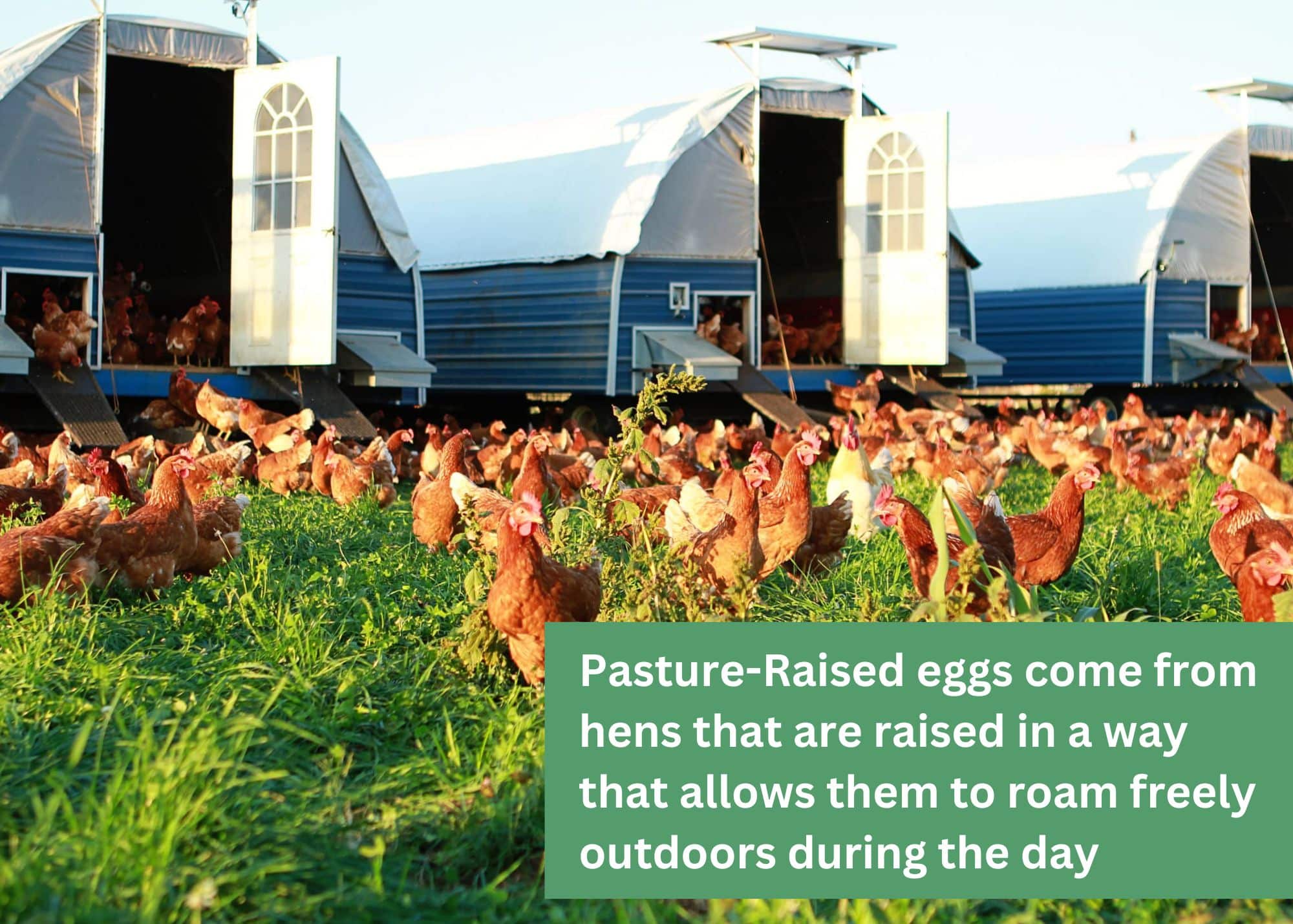
To be considered pasture-raised chickens, there must be 108 square feet of outdoor space per bird. Beyond that, mobile pastured means farmers are also intentional in regularly moving the chicken houses to different areas so the hens can take full advantage of the space, fresh grass, and critters.
The Mobile Chicken House builds on our experience with pasture raised eggs, and we can help you take on the challenge of framing pasture-raised eggs with our tried and true chicken houses!
Are you ready to farm the most amazing eggs your customers have ever tasted? Read on to find out how!
How You As a Farmer Can Raise Healthier Eggs
With the increasing demand for better eggs and a pivot towards more sustainable poultry farming, it’s important to be able to care for your hens and harvest the eggs as humanely and efficiently as possible. This boils down to having an effective, well-designed mobile chicken house that saves you time and labor, yet provides excellent shelter for your chickens to keep them healthy and happy.
Given the complexities of chicken farming, it’s easy to assume that it's difficult to have a sustainable yet profitable operation, but it can be done!
At The Mobile Chicken House, we have personally experienced the frustration and wasted labor of using an inefficient and poorly designed mobile chicken house. That is why we design and build mobile chicken houses that are efficient, automated, and easy to maintain.
Let’s talk about The Mobile Chicken House’s equipment and some of its advantages:
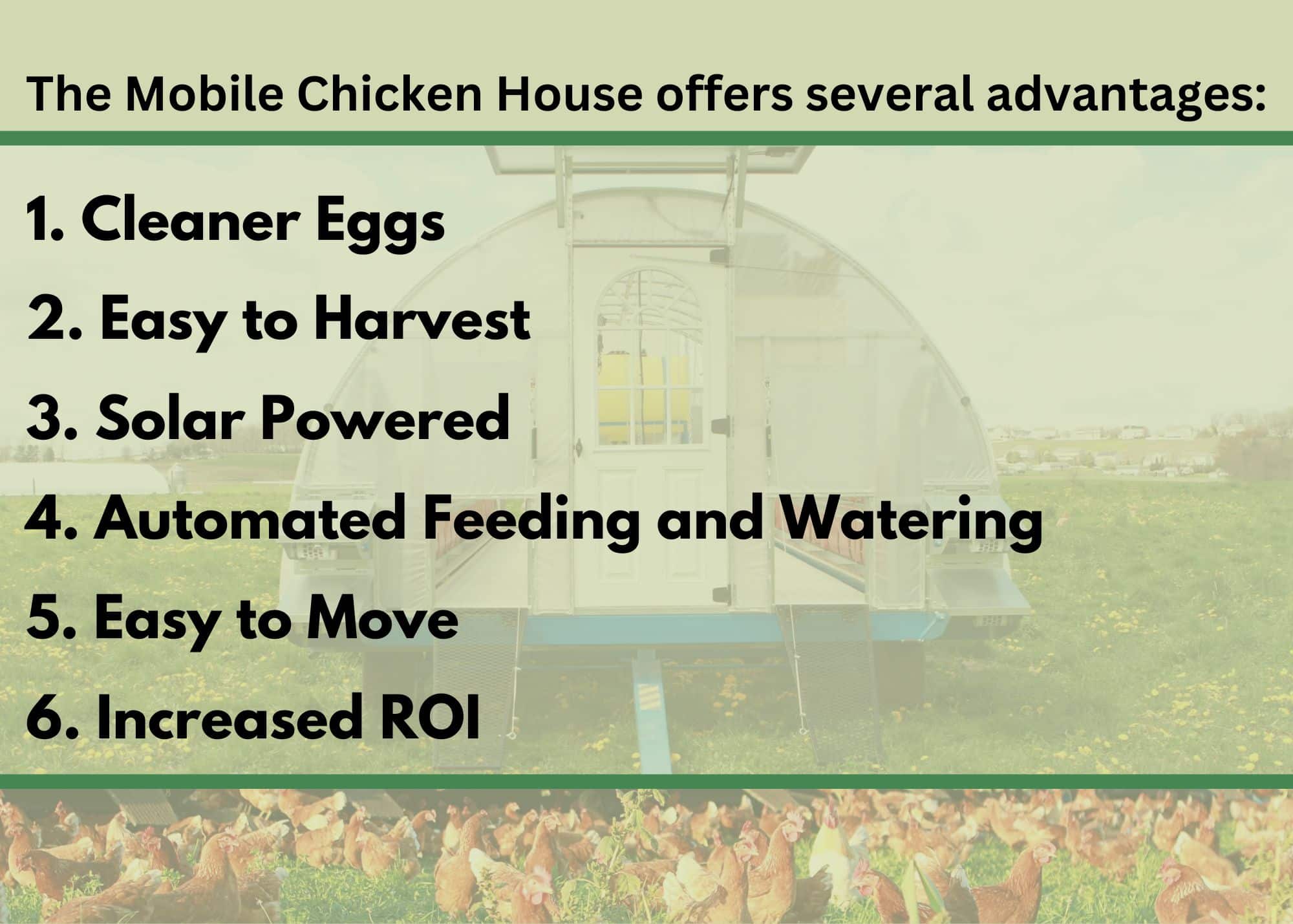
1. Cleaner Eggs
Our chicken houses include several design factors, including a rollaway nest system that moves eggs away from the hens as soon as they’re laid and flooring designed to let manure and dirt pass through. This keeps the eggs, clean, as well as the house and hens, resulting in healthier, more productive chickens!
2. Easy to Harvest
Using a hand-cranked conveyor belt, you can collect the eggs at your own pace without stepping into the house. The egg gathering system allows you to stand at one spot to gather the eggs.
3. Solar Powered
A dedicated DC solar power panel allows you to have a fully automated mobile chicken house, eliminating worries about an external power source. Each house comes standard with a solar panel, battery bank, and control panel.
4. Automated Feeding and Watering
Each chicken house comes with a 1-ton feed storage system and 150 gallon water tank, allowing you to stock 10 days or more food for the and up to 3 days of fresh, clean water for the chickens.
5. Easy to Move
Our chicken houses are lightweight, sturdy, and strong, engineered to be easily movable with a gator or tractor.
6. Increased ROI
Your increased efficiency will result in greater production and ROI. To see how much more profit The Mobile Chicken House will bring you, use our Egg Profit Calculator.
With the vast experience and knowledge from raising chickens, many optional add-ons have been developed by The Mobile Chicken House to adapt your chicken operation to your needs.
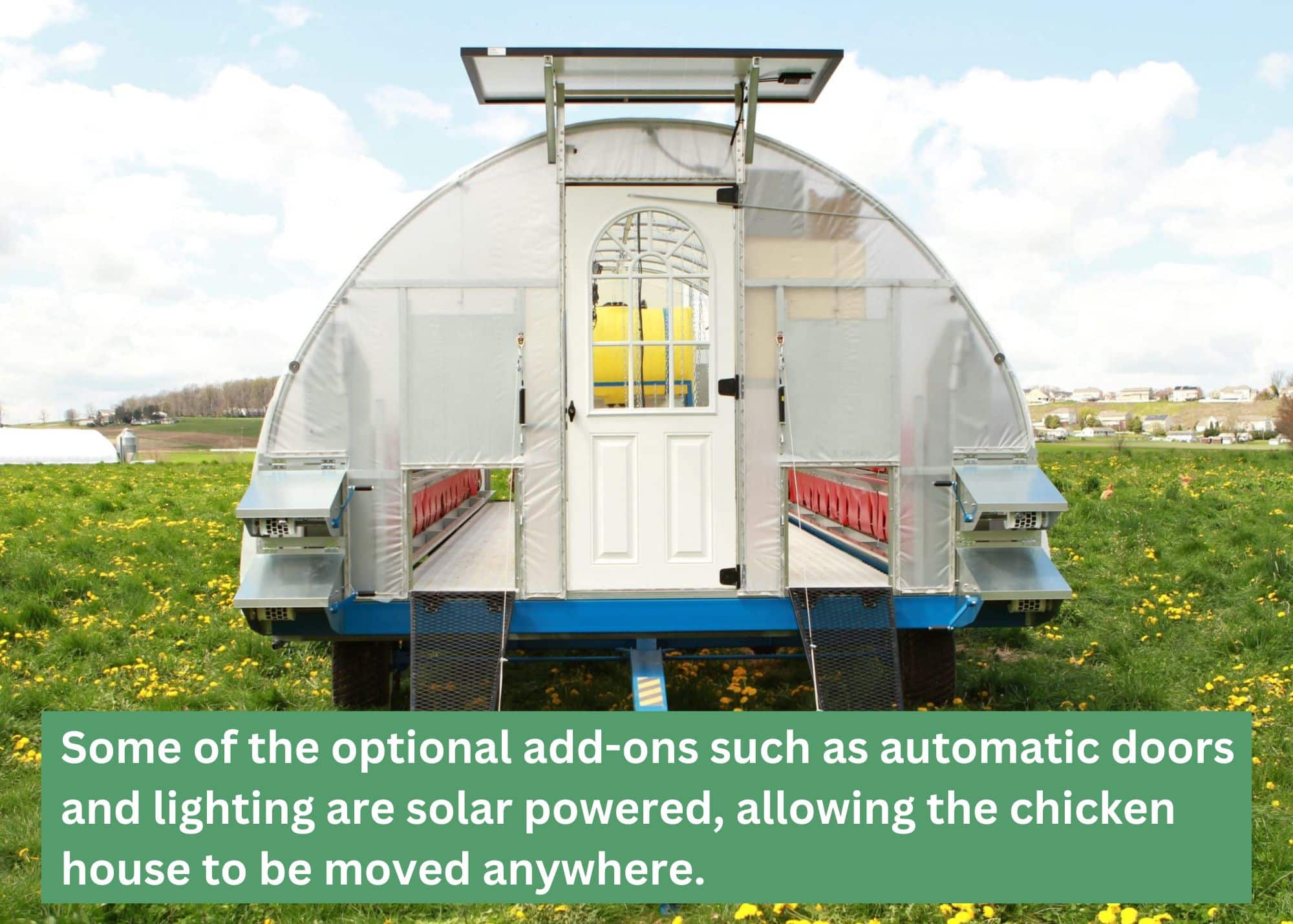
Some of these options are:
- Automatic Closing and Opening Doors - Automatic doors that open and close based on a timer will keep the hens safe and sound in the house. These doors are solar-powered.
- Automatic Lighting System - Depending on the season and area, available natural daylight can be a problem during the fall and winter months. An automated lighting system will provide light resulting in more consistent egg-laying for your hens year-round. The lighting system is also powered by the solar power system.
- Water Temperature Control - if you use the mobile chicken house during winter, the water temperature control will keep the water tank and lines from freezing. This add-on requires an upgrade to a 110V battery bank or access to a standard 110V power source.
In Conclusion
At the Mobile Chicken House, we understand the challenges of pasture raised egg production and want to help you become more successful, sustainable, and efficient in your operation.
It doesn’t matter the size or your farm or operation - we believe it is possible to farm the right way and still succeed!
Get a quote today and see how you can revolutionize your egg harvesting operation!
If you enjoyed this blog, and want to learn more about mobile pastured farming and more, check out some of our blogs:
